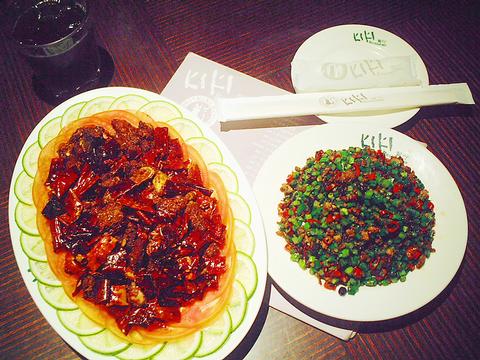While restaurants specializing in hot and spicy Sichuan cuisine are prevalent throughout Taiwan's bustling metropolises, the Kiki Restaurant chain has, over the past decade, built up a reputation not only as one of the classiest of Taipei's numerous Sichuan joints, but also one of the most contemporary.
Kiki offers diners a feast of Sichuan food in an environment far-removed from that of many of the traditional red tableclothed spit-and-sawdust Sichuan joints. With its dim lighting and dark wood furniture, Kiki has all the trappings of a modern European-style eatery rather than that of an Oriental joint. Oriental it is, however, only Oriental with a spicy twist.
"Our aim is to offer diners traditional Sichuan cuisine with a modern twist in even more contemporary surroundings," said employee, You En-lun (

PHOTO: GAVIN PHIPPS, TAIPEI TIMES
The menu is packed with dishes that will set the mouth of even the hardiest chili eater ablaze. And while dishes such steamed and fried egg with pork (
Some of the joints more popular hotter dishes include Taiwanese eel fried with hot chili and pork (
Not all of the joint's dishes are laden with peppers, however. Should diners wish to eat without losing their sense of taste, then dishes such as beef strips with ginger (
While the chiefs at Kiki pride themselves on their spicy dishes, they will make an exception for diners who can't take such large amounts of chili. All the dishes are available with less chili on request.
At present there are four branches of Kiki scattered throughout Taipei. And while they all serve the same fiery selection of food, the largest and most popular branch is the Fuhsing branch, where on occasion celebrities can be spotted mopping their brows as the chili effect kicks in.

When Taiwan was battered by storms this summer, the only crumb of comfort I could take was knowing that some advice I’d drafted several weeks earlier had been correct. Regarding the Southern Cross-Island Highway (南橫公路), a spectacular high-elevation route connecting Taiwan’s southwest with the country’s southeast, I’d written: “The precarious existence of this road cannot be overstated; those hoping to drive or ride all the way across should have a backup plan.” As this article was going to press, the middle section of the highway, between Meishankou (梅山口) in Kaohsiung and Siangyang (向陽) in Taitung County, was still closed to outsiders

US President Donald Trump may have hoped for an impromptu talk with his old friend Kim Jong-un during a recent trip to Asia, but analysts say the increasingly emboldened North Korean despot had few good reasons to join the photo-op. Trump sent repeated overtures to Kim during his barnstorming tour of Asia, saying he was “100 percent” open to a meeting and even bucking decades of US policy by conceding that North Korea was “sort of a nuclear power.” But Pyongyang kept mum on the invitation, instead firing off missiles and sending its foreign minister to Russia and Belarus, with whom it

President William Lai (賴清德) has championed Taiwan as an “AI Island” — an artificial intelligence (AI) hub powering the global tech economy. But without major shifts in talent, funding and strategic direction, this vision risks becoming a static fortress: indispensable, yet immobile and vulnerable. It’s time to reframe Taiwan’s ambition. Time to move from a resource-rich AI island to an AI Armada. Why change metaphors? Because choosing the right metaphor shapes both understanding and strategy. The “AI Island” frames our national ambition as a static fortress that, while valuable, is still vulnerable and reactive. Shifting our metaphor to an “AI Armada”

The Chinese Communist Party (CCP) has a dystopian, radical and dangerous conception of itself. Few are aware of this very fundamental difference between how they view power and how the rest of the world does. Even those of us who have lived in China sometimes fall back into the trap of viewing it through the lens of the power relationships common throughout the rest of the world, instead of understanding the CCP as it conceives of itself. Broadly speaking, the concepts of the people, race, culture, civilization, nation, government and religion are separate, though often overlapping and intertwined. A government